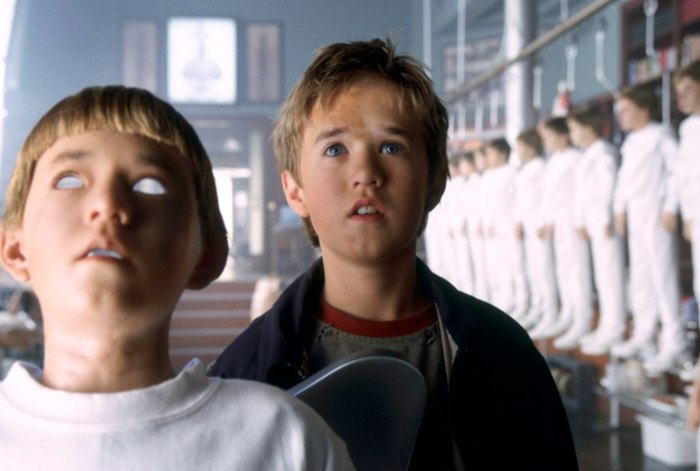Spielberg has never been afraid of the dark. Indeed his films often, unusually, use light as source of terror. Think of the alien presence that stalked Jillian Guiler and her son in Close Encounters of the Third Kind. Even in his family friendly blockbusters, Spielberg has included frightening sequences and some bleak realities. He is sentimental, sometimes to a fault, but sometimes a guy will just get eaten whilst on the toilet. Yet I believe that even more so than his movie about the holocaust, his film about the Normandy invasion, and his film about the Munich Massacre and the subsequent reprisals, his film about the small robot boy who learns to dream stands as his darkest film. Perhaps that can be attributed to its heritage.
It is well known that Artificial Intelligence began as an adaptation developed by the legendary director Stanley Kubrick. Once he died, Steven Spielberg took over the reins of the production our of respect for Kubrick and at the request of Christina Kubrick and producer Jan Harlan. He continued work on the screenplay, removing certain explicit elements involving the character of Gigolo Joe, and began to craft the film in his own inimitable style. The finished film certainly looks like 20th century Spielberg and the John Williams soundtrack completes the whimsical feel of David’s adventure, but beneath the plastic skin is a very dark entity.
The film concerns David (Hayley Joel Osment), a robot boy purchased to comfort a mother, Monica Swinton (Frances O’Connor), as her human son is in a coma and may never awaken. After some initial awkwardness, the two bond and David becomes more human as his connection to Monica grows stronger. When her son wakes from his coma, David begins to experience jealousy and anger, leading to an incident that makes Monica believe David is dangerous. Rather than take him back to the manufacturers for deletion, she decides to abandon him in the woods so that he might find a new life.

So far as Monica is concerned, this is the last she sees or hears of David. She never learns of his journey to find her, she never learns of the experiences he has a long the way or the lessons that form him. For the rest of her life, she lives with the fact that she abandoned a son that loved her. The scenario bleakly recalls a passage from Phillip Pullman’s Northern Lights in which a mother has her child snatched and “when she remembers him, she’ll think it was her fault, and sob her sorry heart out.” So far as we know, Monica never forgot David either.
David’s story, however, continues under the false apprehension that his mother has merely misplaced him and that if he can find a way to become “real”, like his human brother, he will be welcomed into the life he knew all too briefly. To see a child character struggle to become something he fundamentally is not in the hopes of winning his family’s affection is truly devastating. David escapes into the promises of fairy tales, because the real world only wants him gone or separated from the world forever. When David finally meets his maker he is not presented with the opportunity to become human but is instead confronted with his ultimate fear: another robot just like him. It’s the lowest point of his quest as it confirms everything he has feared about himself, and he becomes violent and even suicidal.

Through happenstance he discovers the object of his quest, the fabled Blue Fairy in the form of a statue in an old amusement park and he spends a literally inhuman amount of time wishing for the impossible. In what many fans assumed to be a Spielbergian twist, aliens arrive and are able to finally grant David’s wish of seeing his mother again by cloning her. However this clone will only live for a single day. The prospect of having a loved one back for a single day is terrifying, and surely repellent to any human being who would be unable to escape the temporary nature of the reunion. David is protected in this regard by his childlike belief that perhaps a miracle will happen again and his mother won’t fade away like the others. Early in the film he asks his mother if she will die and the only comfort Monica can offer is that it won’t be for many years. Robbed of this comfort, David must finally confront mortality.
At the end of the film the two characters lie together in bed. Monica falls asleep and the narrator assures us that David knows the truth. That he would now be unable to wake her if he tried and that the eternal moment he had hoped for had passed. He has now accepted the terrible truth that we must all eventually confront about our parents; that one morning they simply won’t be there. The narrator assures us that as David goes to sleep he, for the first time, goes to the place where dreams are born. He has, at long last, become human; not due to any wish or magic or alien technology, but because he has suffered. His suffering and acceptance of mortality allows him to truly achieve humanity.
The prospect of Kubrick making a film about childhood is tantalising, but would inevitably come down to a stark truth. Speilberg added sheen and style and wonder, but kept the difficult message at the story’s heart and realised the film beautifully. Yet neither filmmaker neglected the hope of David’s story. Because who knows what dreams may grow in the robot boy’s mind once he abandons the fairy tales of his youth. Who knows what person he may become now that he’s finally human.
